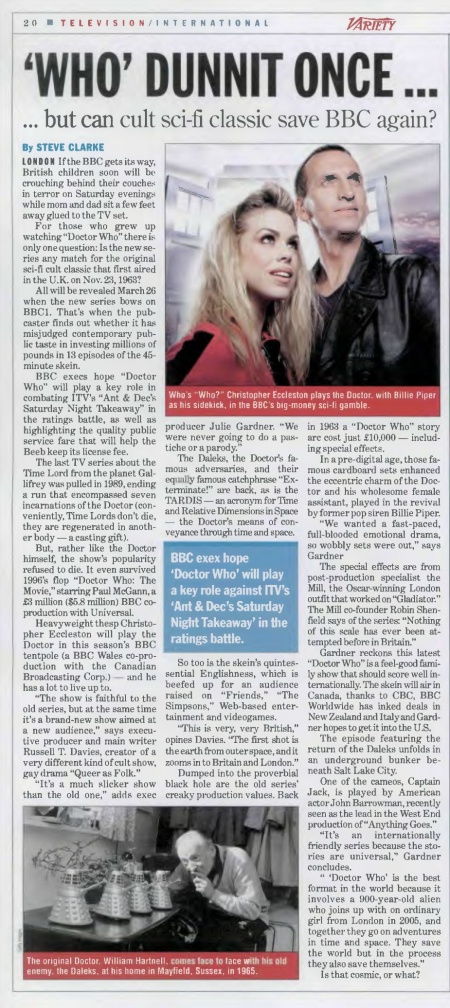Who Dunnit Once ... but can cult sci-fi classic save BBC again?
- Publication: Variety
- Date: 2005-03-21
- Author: Steve Clarke
- Page: 20
- Language: English
LONDON If the BBC gets its way, British children soon will be crouching behind their couches in terror on Saturday evenings while mom and dad sit a few feet away glued to the TV set.
For those who grew up watching "Doctor Who" there is only one question: Is the new series any match for the original sci-fi cult classic that first aired in the U.K. on Nov. 23, 1963?
All will be revealed March 26 when the new series bows on BBC1. That's when the pub-caster finds out whether it has misjudged contemporary public taste in investing millions of pounds in 13 episodes of the 45-minute skein.
BBC execs hope "Doctor Who" will play a key role in combating ITV's "Ant & Dec's Saturday Night Takeaway" in the ratings battle, as well as highlighting the quality public service fare that will help the Beeb keep its license fee.
The last TV series about the Time Lord from the planet Gallifrey was pulled in 1989, ending a run that encompassed seven incarnations of the Doctor (conveniently, Time Lords don't die, they are regenerated in another body — a casting gift).
But, rather like the Doctor himself, the show's popularity refused to die. It even survived 1996's flop "Doctor Who: The Movie," starring Paul McGann, a £3 million ($5.8 million) BBC coproduction with Universal.
Heavyweight thesp Christopher Eccleston will play the Doctor in this season's BBC tentpole (a BBC Wales co-production with the Canadian Broadcasting Corp.) — and he has a lot to live up to.
"The show is faithful to the old series, but at the same time it's a brand-new show aimed at a new audience," says executive producer and main writer Russell T. Davies, creator of a very different kind of cult show, gay drama "Queer as Folk."
"It's a much slicker show than the old one," adds exec producer Julie Gardner. "We were never going to do a pastiche or a parody."
The Daleks, the Doctors famous adversaries, and their equally famous catchphrase "Exterminate!" are back, as is the TARDIS — an acronym for Time and Relative Dimensions in Space — the Doctor's means of conveyance through time and space.
So too is the skein's quintessential Englishness, which is beefed up for an audience raised on "Friends," "The Simpsons," Web-based entertainment and videogames.
"This is very, very British," opines Davies. "The first shot is the earth from outer space, and it zooms in to Britain and London."
Dumped into the proverbial black hole are the old series' creaky production values. Back in 1963 a "Doctor Who" story arc cost just £10,000 — including special effects.
In a pre-digital age, those famous cardboard sets enhanced the eccentric charm of the Doctor and his wholesome female assistant, played in the revival by former pop siren Billie Piper.
"We wanted a fast-paced, full-blooded emotional drama, so wobbly sets were out," says Gardner
The special effects are from post-production specialist the Mill, the Oscar-winning London outfit that worked on "Gladiator." The Mill co-founder Robin Shen-field says of the series: "Nothing of this scale has ever been attempted before in Britain."
Gardner reckons this latest "Doctor Who" is a feel-good family show that should score well internationally. The skein will air in Canada, thanks to CBC, BBC Worldwide has inked deals in New Zealand and Italy and Gardner hopes to get it into the U.S.
The episode featuring the return of the Daleks unfolds in an underground bunker beneath Salt Lake City.
One of the cameos, Captain Jack, is played by American actor John Barrowman, recently seen as the lead in the West End production of "Anything Goes."
"It's an internationally friendly series because the stories are universal," Gardner concludes.
"'Doctor Who' is the best format in the world because it involves a 900-year-old alien who joins up with on ordinary girl from London in 2005, and together they go on adventures in time and space. They save the world but in the process they also save themselves."
Is that cosmic, or what?
Caption: The original Doctor, William Hartnell, comes face to face with his old enemy, the Daleks, at his home in Mayfield, Sussex, in 1965.
Caption: Who's "Who?" Christopher Eccleston plays the Doctor, with Billie Piper as his sidekick, in the BBC's big-money sci-fi gamble
Disclaimer: These citations are created on-the-fly using primitive parsing techniques. You should double-check all citations. Send feedback to whovian@cuttingsarchive.org
- APA 6th ed.: Clarke, Steve (2005-03-21). Who Dunnit Once ... but can cult sci-fi classic save BBC again?. Variety p. 20.
- MLA 7th ed.: Clarke, Steve. "Who Dunnit Once ... but can cult sci-fi classic save BBC again?." Variety [add city] 2005-03-21, 20. Print.
- Chicago 15th ed.: Clarke, Steve. "Who Dunnit Once ... but can cult sci-fi classic save BBC again?." Variety, edition, sec., 2005-03-21
- Turabian: Clarke, Steve. "Who Dunnit Once ... but can cult sci-fi classic save BBC again?." Variety, 2005-03-21, section, 20 edition.
- Wikipedia (this article): <ref>{{cite news| title=Who Dunnit Once ... but can cult sci-fi classic save BBC again? | url=http://cuttingsarchive.org/index.php/Who_Dunnit_Once_..._but_can_cult_sci-fi_classic_save_BBC_again%3F | work=Variety | pages=20 | date=2005-03-21 | via=Doctor Who Cuttings Archive | accessdate=15 May 2025 }}</ref>
- Wikipedia (this page): <ref>{{cite web | title=Who Dunnit Once ... but can cult sci-fi classic save BBC again? | url=http://cuttingsarchive.org/index.php/Who_Dunnit_Once_..._but_can_cult_sci-fi_classic_save_BBC_again%3F | work=Doctor Who Cuttings Archive | accessdate=15 May 2025}}</ref>
